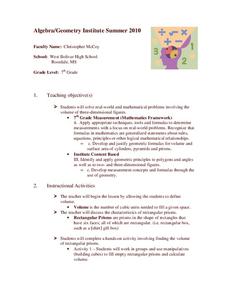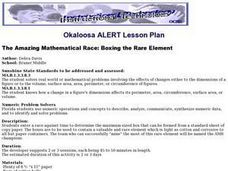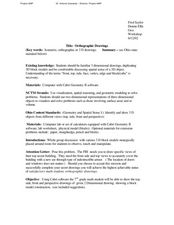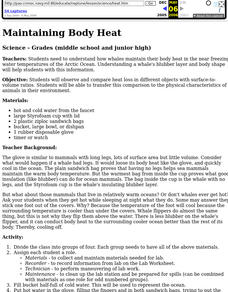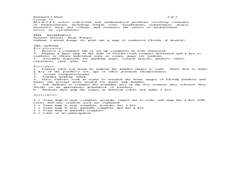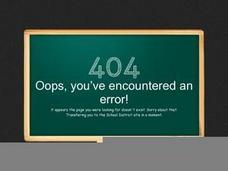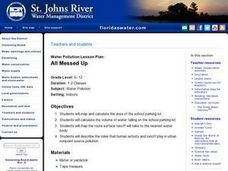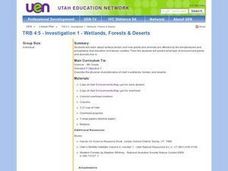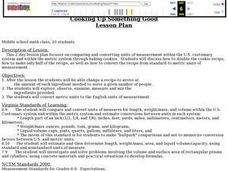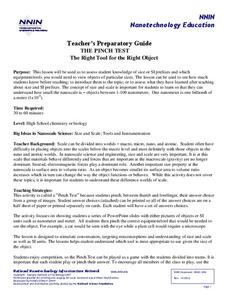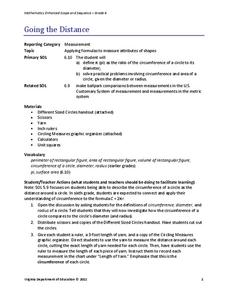Curated OER
Soil pH Effect on Germination of Specific Weeds
Students collect weed seeds from three varieties of weeds (knapweed, thistle, or toadflax, for example they may choose others in addition to the spotted knapweed.) They sterilize soil for thirty containers, plant seeds in sterile soil,...
Curated OER
Measuring the Earth
Students identify types of arcs and angles in a circle, find the measure of arcs and angles, and solve real world problems involving lengths of segments in circles, lengths, and areas.
Curated OER
Measurements
Seventh graders solve word problems involving real world situation. For this geometry lesson, 7th graders solve problems related to volume. They apply the formulas taught in geometry.
Curated OER
The Amazing Mathematical Race: Boxing the Rare Element
Students enter a race against time to determine the maximum sized box that can be formed from a standard sheet of copy paper. The boxes are to be used to contain a valuable and rare element which is light as cotton and corrosive to all...
Curated OER
Pape's Theorems
For this math worksheet, students find the length of the side of a regular hexagon whose area is numerically equal to its perimeter.
Curated OER
Design a Better Classroom Workplace
Students design a new classroom workplace. For this architecture lesson, students use area formulas to identify the problem with the existing desks in their classroom. Students design their own solution volume formulas to solve the...
Curated OER
Cones, Cylinders, Spheres
Students classify polygons by name and shape. In this geometry instructional activity, students identify the lateral surface of each conic. They differentiate between cones, cylinders and spheres.
Curated OER
Orthographic Drawing
Young scholars investigate orthographic drawings. In this geometry lesson, students identify properties of three dimensional drawings in space. They solve problems using volume and area formulas.
Curated OER
Area graphics for 7th graders
Students randomly select dimensions for three geometric shapes (square, right triangle and circle). From the graphs they compare and contrast the graphical results of each shape.
Curated OER
Floating Pencil
Students discover how salt water makes a pencil float better than freshwater by measuring and comparing the lengths of the portion of the pencil that floats above the water surface. They then determine if an unknown water sample is...
Curated OER
Maintaining Body Heat
Students observe and compare heat loss in different objects with surface-to-volume ratios. They transfer this comparison to the physical characteristics of animals in their environment. They focus on how whales maintain their body heat.
Curated OER
Home on the Range
Students use maps and mathematics to determine the appropriate panther population in a given area. In this Florida ecology lesson, students research the area requirements of male and female panther and use a map to help calculate how...
Curated OER
Math Under Pressure
Students are told that an air tank contains a fixed volume of air under pressure. As air is used, the pressure decreases at a rate that depends on the depth. Students discuss how SCUBA divers calculate the amount of time they can spend...
Curated OER
Eagle Creek Park (A Hike)
Students plot a hiking course using aerial photos and a topographic overlay and find the latitude and longitude of absolute locations. They measure the total distance of a hiked area and figure the area of the ground walked using Heron's...
Curated OER
Travelogue of a Planet
High schoolers randomly select a planet, including Earth. They research key features of the planet including mass, volume, density, gravity, temperature, weather, geology, atmosphere, surface features, location from sun, Earth and other...
Curated OER
All Messed Up
Young scholars begin the experiment by mapping and calculating their school parking lot. They calculate the volume of water falling on the lot and map the route the water runoff takes. They discuss the roles that humans play in affecting...
Curated OER
Investigation 1 - Wetlands, Forests & Deserts
Fourth graders examine surface terrain and how plants and animals are affected by the temperatures and precipitation that elevation and terrain creates. Then students predict what type of environment plants and animals live in.
Curated OER
Cooking Up Something Good
Students compare and convert units of measurement within the United States customary system and within the metric system by baking cookies. Students discuss how to double the cookie recipe, how to make only half of the recipe, and how to...
Curated OER
Geometry and Shapes
High schoolers discuss and identify polygons and lines. In this geometry instructional activity, learners review liner, square and cubic units so they can incorporate it into the instructional activity on measurement and creating packing...
Virginia Department of Education
The Cell Cycle and Mitosis
What a packed instructional activity! Provide your class with the opportunity to learn about the cell cycle in several exciting ways. Biologists first learn about the theory behind mitosis, then proceed to view onion tips under the...
National Nanotechnology Infrastructure Network
The Pinch Test
Test your pupils' understanding of the scale from macro to atomic. While displaying images of different materials, learners identify what they would need to make that material visible. Their choices range from the human eye to an...
Mathematics Assessment Project
Designing 3d Products: Candy Cartons
Wouldn't it be great to work in a candy factory? Learners get their chance as they first design a carton for a candy that meets certain requirements. They then examine and analyze nets and explanations in sample student responses.
LABScI
Freezing Point Depression: Why Don’t Oceans Freeze?
Can you go ice fishing in the ocean? Learners examine the freezing point of different saltwater solutions. Each solution has a different concentration of salt. By comparing the freezing points graphically, they make conclusions about...
Virginia Department of Education
Going the Distance
Estimate the value of one of the most famous irrational numbers. The hands-on lesson plan instructs classmates to measure the circumference and diameters of circles using yarn. The ratio of these quantities defines pi.
Other popular searches
- Surface Area and Volume
- Surface Area Volume
- Surface Area Volume Cylinder
- Surface Area to Volume Ratio
- Surface Area Volume Project
- Change Surface Area Volume
- Sphere Volume Surface Area
- Area Volume Surface Area
- Geometry Surface Area Volume
- Cells Surface Area Volume
- Volume Surface Area Prism
- Cell Surface Area and Volume




